The archive collects information on past events and provides an overview of completed research projects and doctoral projects related to the Professorship of the History of Science.
Printed programmes and other image material for events prior to 2020 have unfortunately been largely lost due to the relocation of the professorship for the History of Science from the Max-Weber-Kolleg to the Department of History in October 2020. These events can therefore only be archived with date and title.
An overview of all lectures at the Professorship for the History of Science can be found here.
16. & 17. Oktober 2025 | Workshop | Universität Erfurt | Forschungsbau „Weltbeziehungen“ (C.19), SR1
In gegenwärtigen gesellschaftlichen Auseinandersetzungen wird immer wieder spürbar, dass auch geringer Konsumverzicht von einem relevanten Anteil der Bevölkerung anscheinend als empfindliche Freiheitseinschränkung erlebt wird. Dies hat Anstoß gegeben zu Reflektionen, wie diese erlebte Verbindung von Freiheit und Konsum gesellschaftlich zustande gekommen ist (siehe etwa Lepenies 2022). Noch wenig beleuchtet ist dabei, wie dieser politisch-ideengeschichtliche Prozess mit einem Strukturwandel des Eigentums zusammenhängen könnte. Der interdisziplinär ausgerichtete Workshop dient dazu, dieser Frage nachzugehen.
Auf dem Workshop soll es darum gehen, dem aktuellen gesellschaftlichen Spannungsfeld eines identitätsbildenden Konsums und der gesellschaftlichen Potentiale oder Hindernisse für eine sozialökologische Transformation historisch und soziologisch in der Analyse näher zu kommen. Denkbar sind sowohl historische als auch gegenwartsbezogene Beiträge, die sich im interdisziplinären Feld einer ökologisch informierten politischen Ideengeschichte und Philosophie, der Umweltgeschichte, der Sozialtheorie oder einer empirisch orientierten Soziologie bewegen. Es soll darum gehen, diese Disziplinen in einen thematischen Dialog miteinander zu bringen.
16. & 17. September | Workshop | Universität Erfurt | IBZ
Zum achten Mal veranstaltet das Forum Geschichte der Humanwissenschaften in Zusammenarbeit mit der Professur für Wissenschaftsgeschichte der Universität Erfurt, der Universität zu Lübeck sowie der Fachgruppe Geschichte der Psychologie der Deutschen Gesellschaft für Psychologie (DGPs) eine Schreibwerkstatt für laufende Projekte zur Geschichte und Theorie der Psychologie und angrenzender Wissensbereiche (Psychotherapie, Psychiatrie, Anthropologie etc.). Ziel ist die konstruktive Arbeit an Aufsätzen und Kapitelentwürfen zu Buchprojekten, Dissertationen oder Abschlussarbeiten, die im Rahmen der Werkstatt durch kollektives Feedback und den Austausch mit erfahrenen Wissenschaftler:innen weiterentwickelt werden.

Master Class: "Truth Politics between Science and Society (1960-today)"
10 July 2025 | Master Class | University of Erfurt
The masterclass is part of the workshop “Truth Politics between Science and Society. Political Epistemologies of the 1990s Science Wars” (July 8-9, 2025). It will be led by Jamie Cohen-Cole (George Washington University), Bernhard Kleeberg (University of Erfurt), and Anja Laukötter (Friedrich Schiller University Jena). We invite early career researchers (Master and PhD students) to explore historical debates at the nexus of truth, science, and society.
We invite early career researchers to send a short CV, and a 300-word abstract of their research to forschungsstelle.wahrheit@uni-erfurt.de. The deadline for submission is April 30, 2025. Applicants will be notified of the acceptance of their proposal by mid-May. Accepted participants are required to send in their full paper (about 20 pages) by June 16, 2025. All papers will be pre-circulated and constitute compulsory reading for the masterclass.

Conference: "Truth Politics between Science and Society. Political Epistemologies of the 1990s Science Wars"
08 & 09 July 2025 | Conference | University of Erfurt | IBZ
The Science Wars represent a historic peak and intersection of academic, political, and epistemological debates that had been smoldering for decades before, leaving a contested legacy.
A fresh perspective on the Science Wars – one that acknowledges their historical complexity, moves beyond a dualistic framing, and situates them firmly in their historical moment – promises to illuminate the social, political, and cultural ramifications on academia and beyond. The workshop aims to map and historicize the shifting epistemological landscapes of the 1990s from an international perspective informed by methods of Historical and Political Epistemology.

Study Day History of Sciences2025/1
12 February 2025 | Kleine Synagoge Erfurt
Im Februar veranstaltet die Professur für Wissenschaftsgeschichte ihren Studientag Wissenschaftsgeschichte und diskutiert dabei aktuelle Forschungs- und Publikationsprojekte von Lehrstuhlangehörigen und -assoziierten.
Diskutiert werden unter anderem Texte von Alexej Lochmatov, Anna Möller, Dirk Schuck, Erik Kaiser, Johanna Hügel, Karin Reichenbach, Nadija Kiss, Sascha Harnisch, Sebastian Ripl und Tania Arcimovich.
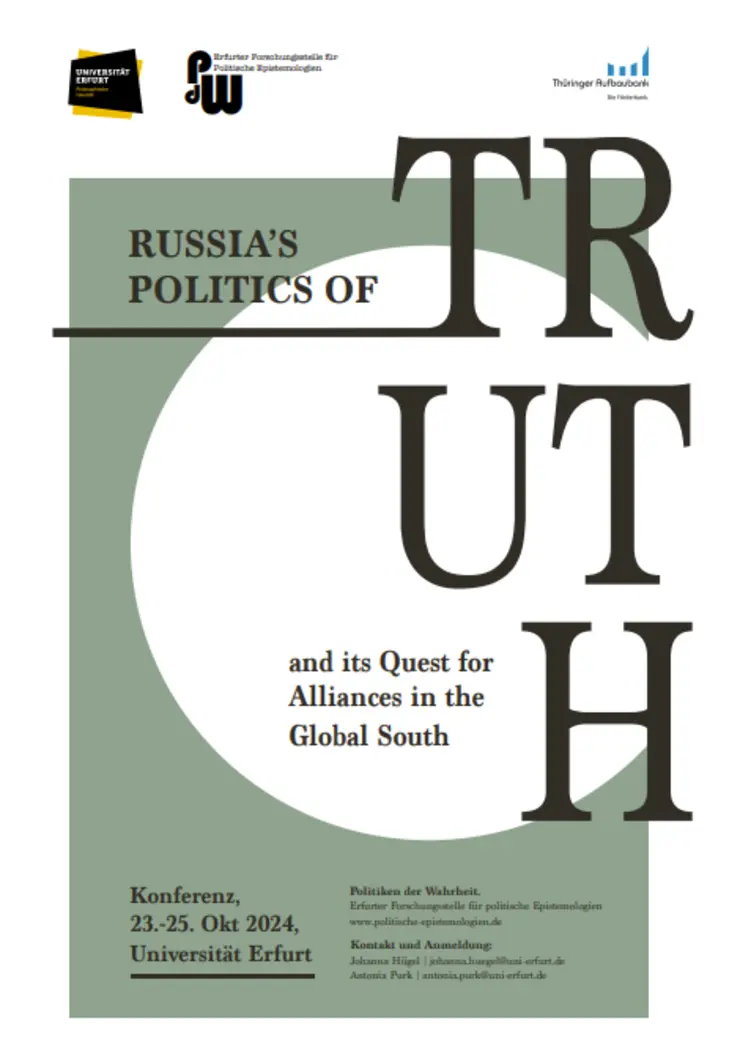
23.10.2024-25.10.2024 | University of Erfurt | Politics of Truth Research Centre
Since 2014, we have been able to observe Russia portraying itself increasingly not just as the only remaining power of the morally good and historically true. In relation to countries of the Global South, Russia has also especially presented itself as an anti-colonial protecting power. This framing is anchored within two broader narratives: First, under the slogan of "historical truth", Putin is pushing a specific historical policy, the central reference point of which is the victory of the Soviet Union over Nazi Germany in the so-called Great Patriotic War. This newly structured and enhanced past is turned into an ever-present prism - through iterative references by the state media, but especially events that allow a large portion of the population to directly participate in the commemoration of this past - by which the present can also be seen and interpreted (McGlynn 2023). At high-profile media events such as the Russia-Africa Summit, the Soviet Union's support of anti-colonial liberation movements has increasingly become part of these historical memory and updating practices, through which the claim of being on the "right side of history" is made.
This workshop aims at analysing how Russia stages itself as an anti-colonial protecting power. With the help of which terms and concepts, but also media and political techniques, is the Putin regime working to restructure the Russian and global past and present? How are new alliances and imagined communities created, especially with countries of the Global South? As an analytical lens we propose methodological approaches such as political epistemology and praxeology.
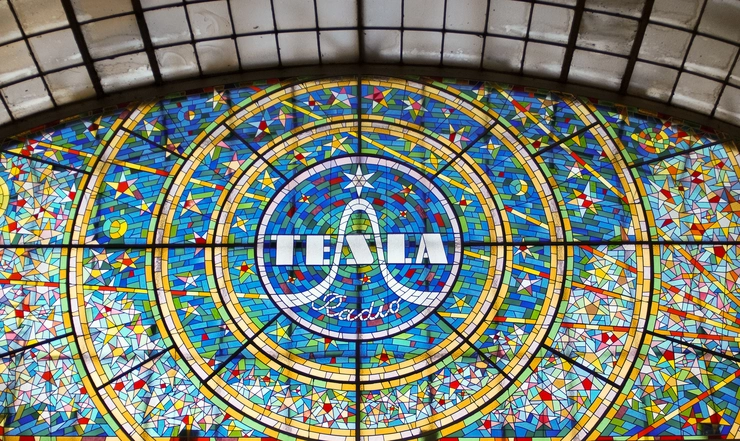
06.06.2024-08.06.2024 | National Hellenic Research Foundation Athens | Research Centre PECEE
The Institute of Historical Research of the National Hellenic Research Foundation (Athens, Greece), the Faculty of Philosophy of the University of Erfurt (Germany), the Leibniz Institute for the History and Culture in Eastern Europe (Leipzig, Germany), the Faculty Center for Transdisciplinary Historical and Cultural Studies at the University of Vienna (Austria) and the Masaryk Institute and Archives of the Czech Academy of Sciences (Prague, Czech Republic) organise an international conference on the intersections of sciences, ideologies, and religions in the 20th century in Central, Eastern and Southeastern Europe. The aim of the conference is twofold. First, it aims to study historical cases, in which sciences, ideologies and religions seem to intersect, or in which boundaries were explicitly set. Secondly, from an epistemological perspective, we will investigate the practices and effects of delineation, the "boundary making" (Gieryn). How do making and doing "science", "ideology", and "religion" influence one another, how do they change during contact?
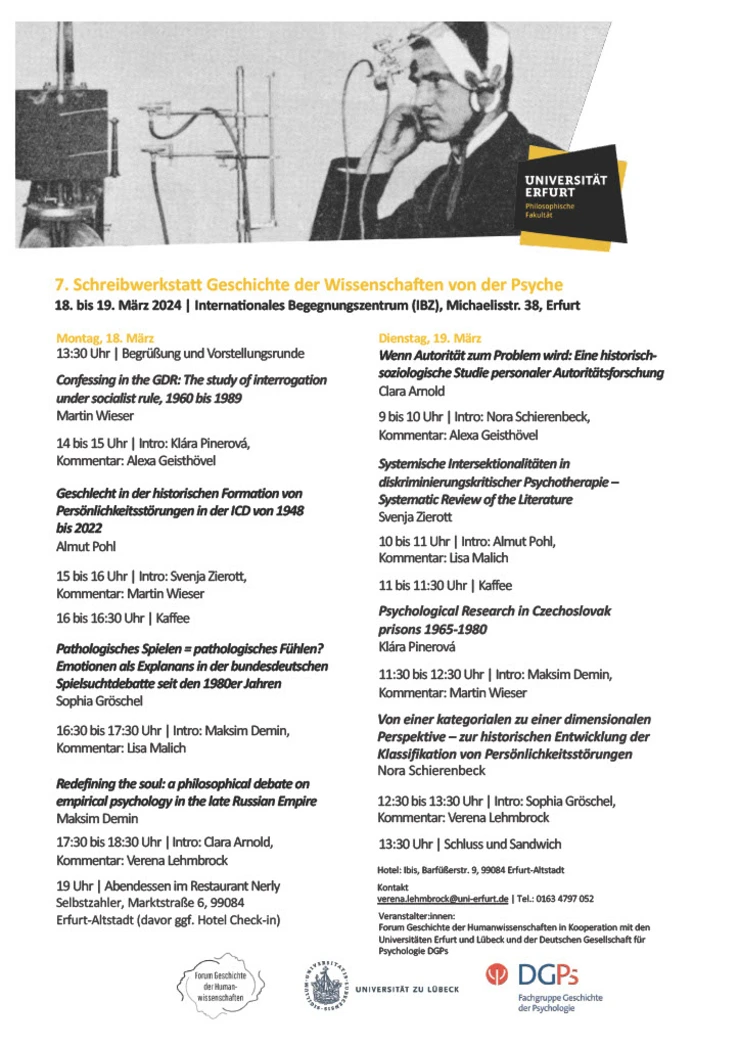
18.03.2024-19.03.2024 | University of Erfurt | Professorship for the History of Science & Forum "History of the Human Sciences"
For the seventh time, the History of Human Sciences Forum, together with its cooperation partners, is organising a writing workshop for ongoing projects on the history and theory of psychology and related fields of knowledge (psychotherapy, psychiatry, anthropology, etc.). The aim is to work constructively on essays and chapter drafts for book projects, dissertations or theses, which will be discussed together with experienced researchers.
22.02.2024-23.02.2024 | University of Erfurt | Professorship for History of Science & Research Centre PECEE
The triumph of intelligence in the late 19thand early 20thcentury made it one of the most popular research subjects in the history of science. Artificial and swarm intelligence, the sociological critique of the 'I.Q. ideology,' the racism of intelligence research, and the role of the discourse on intelligence in popular culture have been the central issues in recent scholarship. Our workshop aims to change the focus of these debates. We intend to discuss not intelligence research itself but the social and political conditions that allowed intelligence to advance to its leading position in the scientific agenda, as well as the constellation of developments in both sciences and humanities that prepared its career. Our idea is to explore this phenomenon in relation to central 'sociological' categories such as social grouping, morality, stability, and normality. We will also examine how the scientific authority of intelligence influenced not only conservative, meritocratic, and racist discourses, but also socialist, anarchist and other social theories orientated towards social inclusion. Thus, the questions of social and political grouping rather than the traditional perspective of differential psychology will come to the fore in our discussion.

13.07.2023-14.072023 | University of Erfurt | Professorship of History of Science, in cooperation with the History Department of the University of Erfurt and the Student Council
How can I reflect on my role and work in the process of writing and communicating history, make it transparent and put it up for discussion? This question is becoming increasingly important for critical historical work, both in research and in historical mediation work; other disciplines have long since taken up this challenge. But how fundamentally is critical reflection on one's own point of view structurally anchored in the study, research and practice of history? Does this question arise in a special way for public history - in the sense of thinking about history in, with and for the public? Can it function as an instance of reflection? In our next workshop, we want to explore the opportunities and limits of (self-)reflective academic practice across disciplines, taking public history as our starting point.
We cordially invite all interested parties to join us in dialogue on these and other questions and to enrich the discussion with as many different perspectives as possible. There will also be the opportunity to join in online and participate in the discussion via chat. The event will be accompanied by a graphic recording. Written interpreters will also translate the spoken language into written language for deaf participants. Questions about the barrier-free accessibility of the individual venues can be addressed to the organisers.
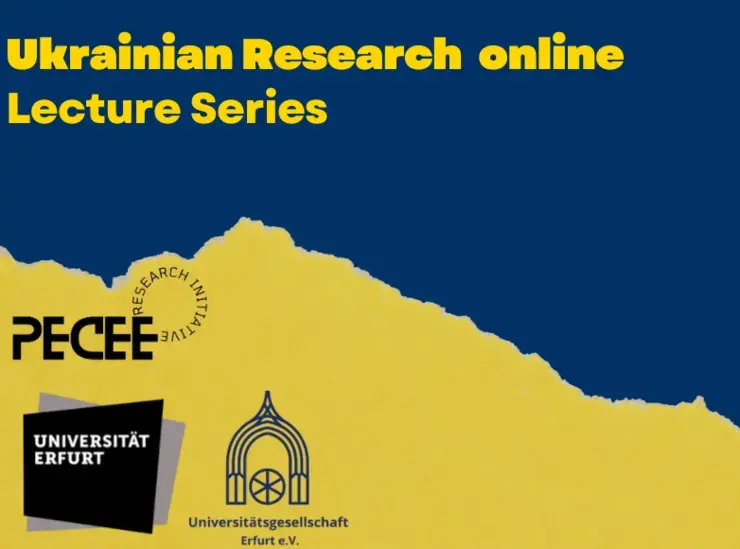
all year round | Online | Research Centre PECEE, in cooperation with the Universitätsgesellschaft Erfurt e.V.
In cooperation with the Ukraine Initiative of the University of Erfurt and the Universitätsgesellschaft Erfurt e.V., we are launching the lecture series Ukrainian Research online to provide visibility for our Ukrainian colleagues and their work.
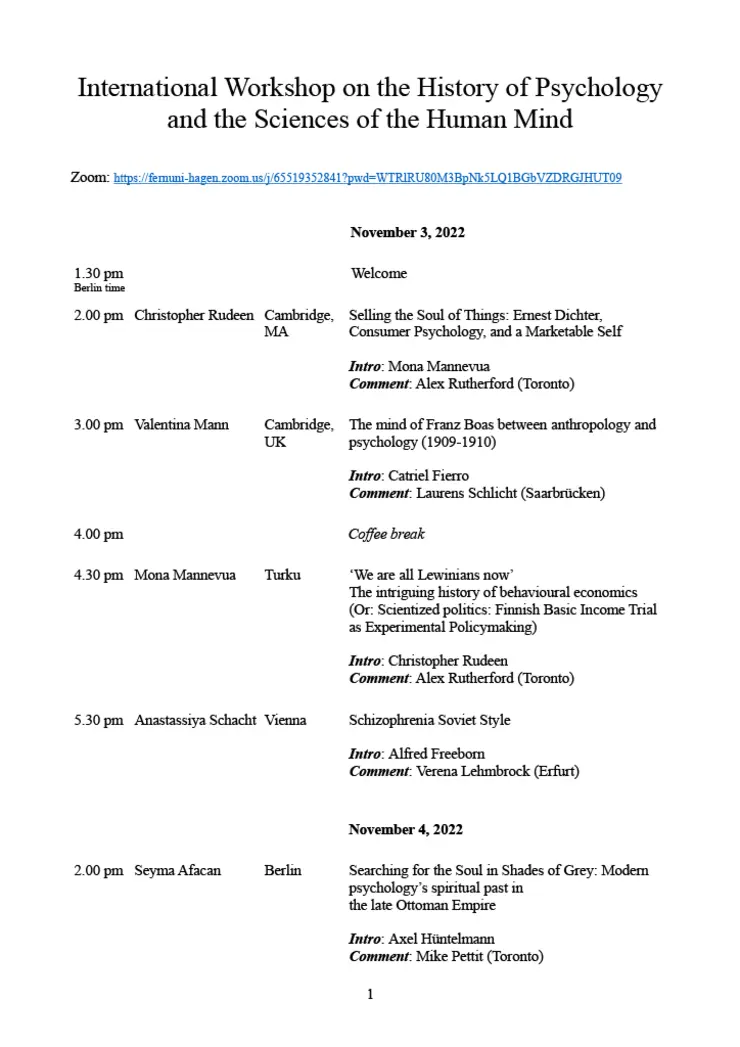
03.11.2022-04.11.2022 | Online | Professorship for the History of Science & Forum "History of the Human Sciences"
In cooperation with the Max Planck Institute for the History of Science, Berlin, and the Erfurt Chair for the History of Science, the German Forum for the History of the Human Sciences is organising its fifth workshop for ongoing projects on the history of psychology and other disciplines that explore the human mind (anthropology, psychoanalysis, psychiatry, phrenology, etc.). We are open to all contributions on this topic, regardless of their epochal or regional focus. The aim of the workshop is to discuss drafts for journal articles, chapters for master's theses, dissertations or book projects. We invite experts in the history of the humanities to discuss these drafts with us.
Organised by Laurens Schlicht, Verena Lehmbrock and Carola Oßmer.

13.10.2022-15.10.2022 | Czech Academy of Sciences, Prague/ Liblice | GWMT e.V. & Research Centre PECEE
To deepen the question of how gender and epistemologies are related, a praxeological approach can be useful. Hence, combining the perspectives on "doing gender" and "doing truth" could allow to inquire how claims of truth are linked to gender and gender politics. In such a praxeological perspective we can ask about roles and figures that perform truth and gender in arenas of contested knowledge, enabling us to discern and analyse situations where gender is inextricably assigned to aspects of truth speaking. We seek for examples where gender is relied upon to invoke the truth, like in the politicisations of experiential and embodied knowledge in current debates on the so-called cancel culture. And we would like to study cases where gender perceived characteristics or values are attributed to concepts of un-/credibility and un-/truthfulness as e.g. in conceptions of heroism and honour, innocence and virginity or deceitfulness and fraudulence.
Thus, the conference "Gendering Epistemologies" wants to discuss how gender-shaped (especially scientific) knowledge and truth claims are tied to gender (politics) in Central and Eastern Europe in the 20th and 21st centuries. We would like to particularly focus on this region in order to strengthen its presence and representations in the debate on gender, science and politics. Furthermore, the region has faced repeated political upheavals in the 20th and 21st centuries, providing the context for numerous epistemological distortions and transformations. Comparative and contrasting examples from other regions of the world are nevertheless equally welcome.
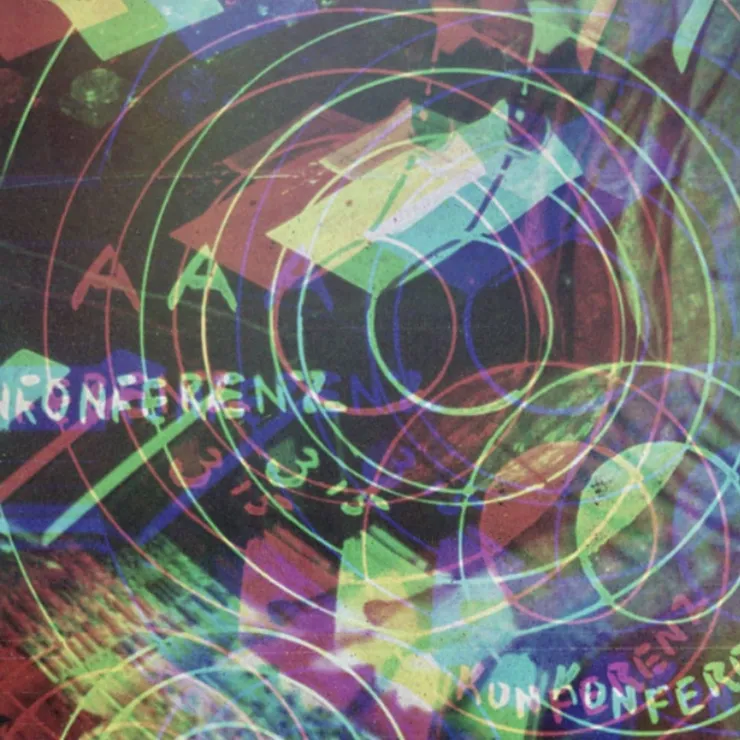
21.09.2022-23.09.2022 | University of Erfurt | GWMT e.V. & Professorship for the History of Science
Under the title "...Humanities", the 2022 annual conference of the Gesellschaft für Geschichte der Wissenschaften, der Medizin und der Technologie (GWMT) is primarily dedicated to the history of the humanities. The aim is to take account of a still relatively young field of research in the history of science, but above all to focus on the self-reflection of the history of science, medicine and technology as humanities. The fact that it is by no means self-evident that the representatives of these disciplines see themselves as humanities scholars, but perhaps rather as science researchers, cultural scientists or social scientists, already points to the fundamental problem itself.
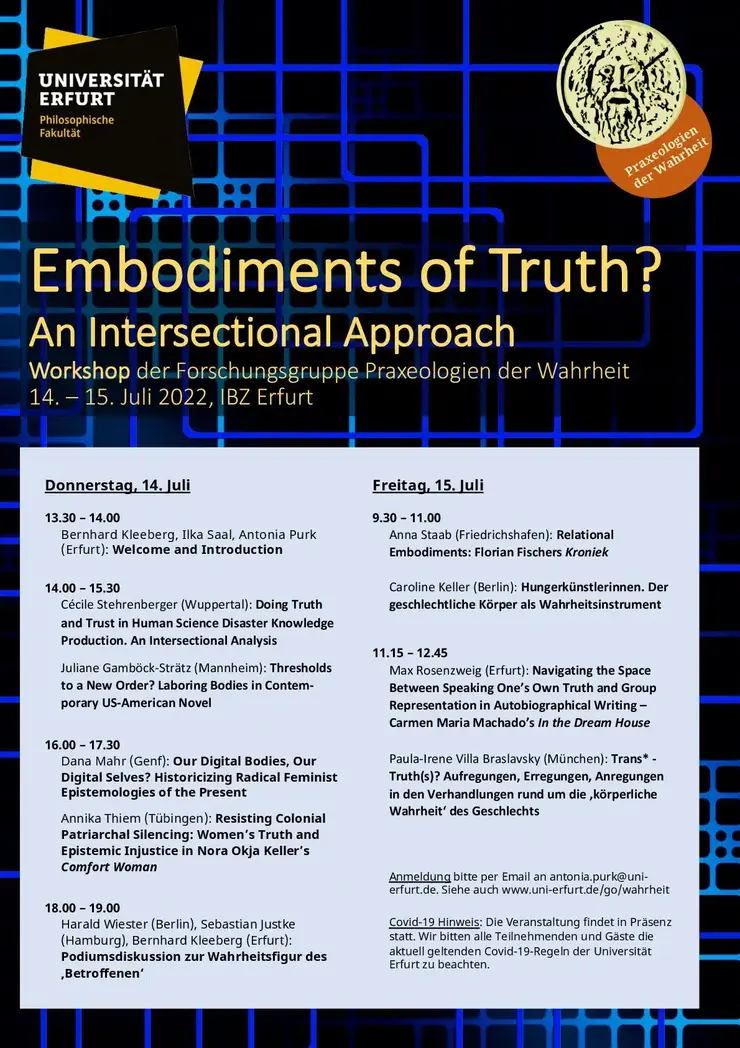
14.07.2022-15.07.2022 | University of Erfurt | Politics of Truth Research Centre
In July 2022, the research group "Praxeologies of Truth" organised the workshop "Embodiments of Truth?", which explored the fundamental bodily performativity of truth. As a social operator, truth is observable in scenarios in which the relationships and communicative practices of its actors are negotiated via their bodies. The workshop examined the concrete roles that are ascribed to human bodies in truth scenarios and acted out by them. How do bodies participate in truth scenarios? Can any person with any body act as a truth figure (judge, witness, priest, translator, etc.), or do discursive attributions to their bodies become an obstacle here?
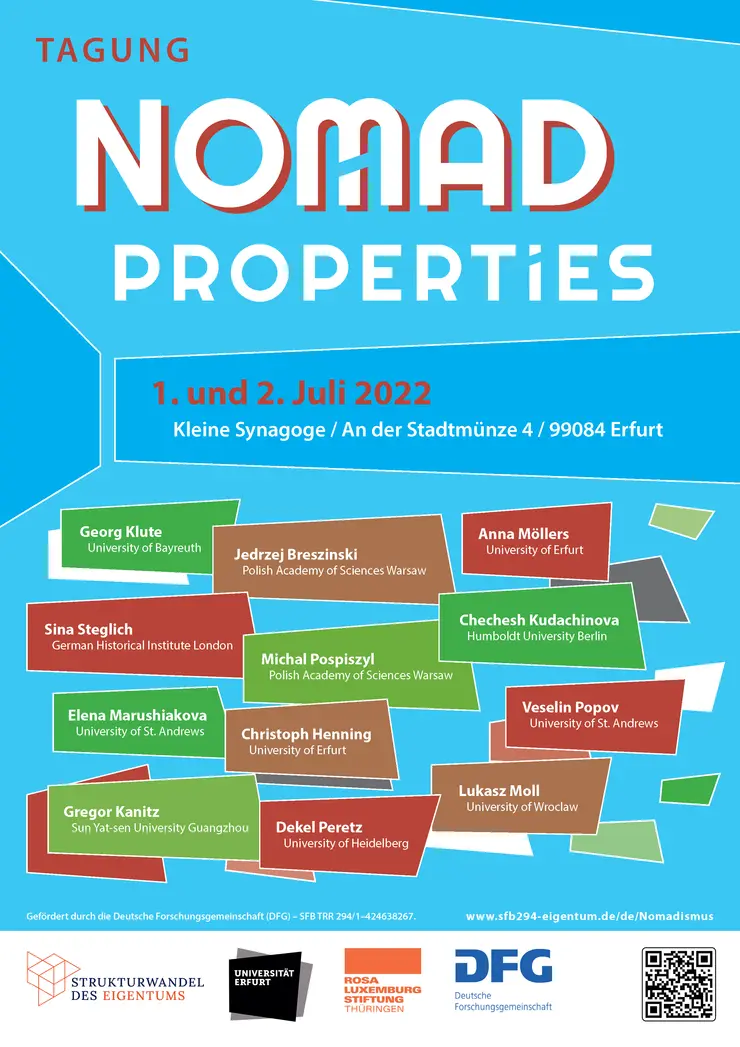
30.06.2022-02.07.2022 | Nordbahnhof Erfurt & Small Synagogue Erfurt | SFB249 subproject A03
The first forum for asphalt nomads will take place on Thursday, 30 June from 2 pm at Nordbahnhof Erfurt. Invited are all those who lead a mobile or travelling life themselves or are interested in exchanging ideas about it. The colourful screen-print poster exhibition "Vaga-Wanderkoffer" by Beat Gipp will also take a look at motifs of street life and the visual worlds of vagabonds.
On 1 and 2 July, the conference will then focus on the theory surrounding the development of the concept of nomadism since the 18th century and examine the connection between nomadic structures and property. It will take place at the Kleine Synagoge event venue in the city centre and will then bring together academics from Germany, Poland, Great Britain, China and Russia over the next two days, who will examine the relationship between nomadism and property from a variety of perspectives. Further information
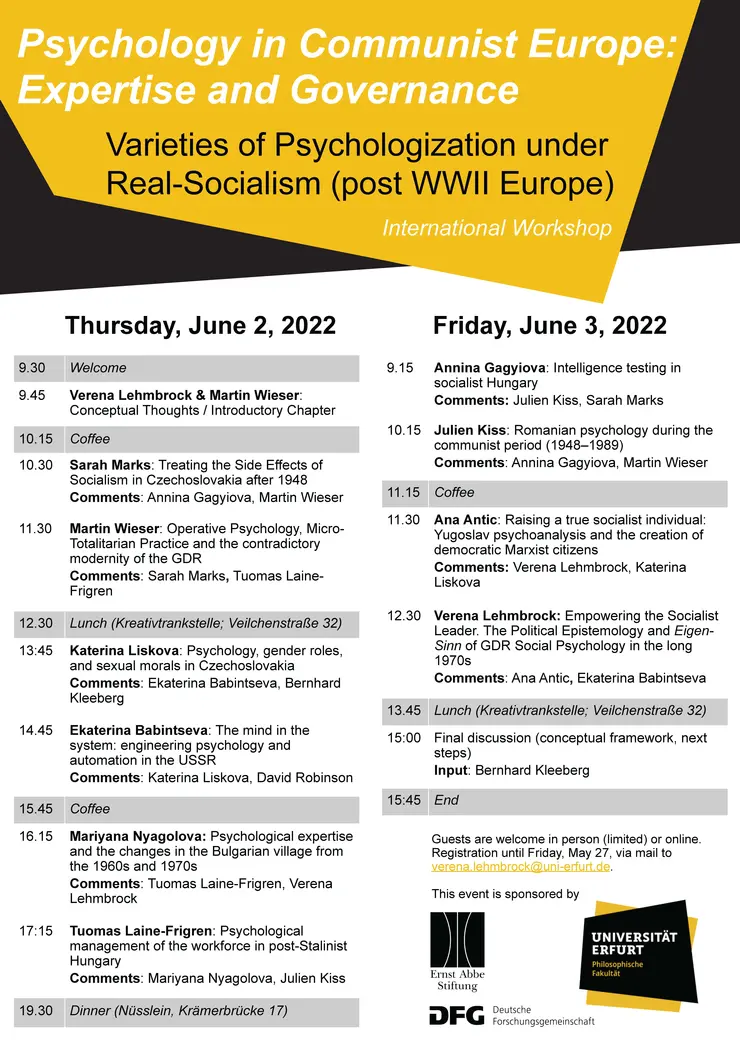
02.06.2022-03.06.2022 | University of Erfurt | Professorship for the History of Science
Forms of applied psychology have steadily gained in importance in the 20th century. Psychologisation reached a new peak in the second half of the century, when previously therapeutic practices also spread into non-clinical areas, for example in self-awareness groups or management training. It is striking that this psycho-boom has so far been discussed almost exclusively as a Western phenomenon. A far-reaching thesis of research is that psychological interventions in Western societies have even become a component of liberal governance - in that, as technologies of the self, they contribute to individuals increasingly regulating and optimising their own behaviour.
The workshop asks: Are psychological self-techniques limited to the context of liberal democracies? A series of concrete case studies from socialist countries will be used to work out the meanings and functions of psychological expertise in state socialism.

08.04.2022 | Gotha Research Centre | SFB249 Subproject A03 & Research Network "Natural Law 1625-1850"
In the political anthropology of the 17th, 18th and 19th centuries, property occupies a diverse and constantly changing, but always central position. If the context of pre-colonial European expansion across the world's oceans already played a role at the beginning with Grotius, this applies all the more to the interweaving of natural law and civilisation theories of the Enlightenment period, and even more so to the beginnings of legal anthropology and the psychology of peoples in the 19th century, when colonialism reached its peak. The functions of the respective concepts of property, the continuities and discontinuities of the thematisation and the ideological burdens of colonial ways of thinking will be examined.
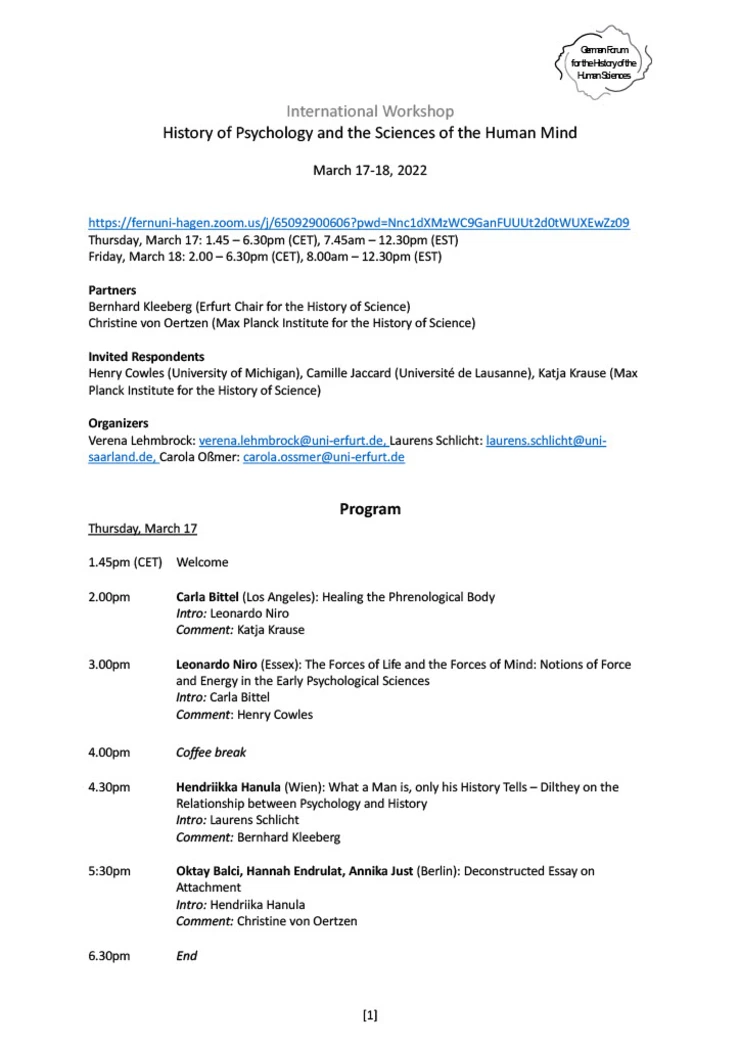
17.03.2022-18.03.2022 | Online | Professorship for the History of Science & Forum "History of the Human Sciences"
In cooperation with the Max Planck Institute for the History of Science, Berlin, and the Erfurt Chair for the History of Science, the German Forum for the History of the Human Sciences is organising its fifth workshop for ongoing projects on the history of psychology and other disciplines that study the human mind (anthropology, psychoanalysis, psychiatry, phrenology, etc.). We are open to all contributions on this topic, regardless of their epochal or regional focus. The aim of the workshop is to discuss drafts for journal articles, chapters for master's theses, dissertations or book projects. We invite experts in the history of the humanities to discuss these drafts with us.
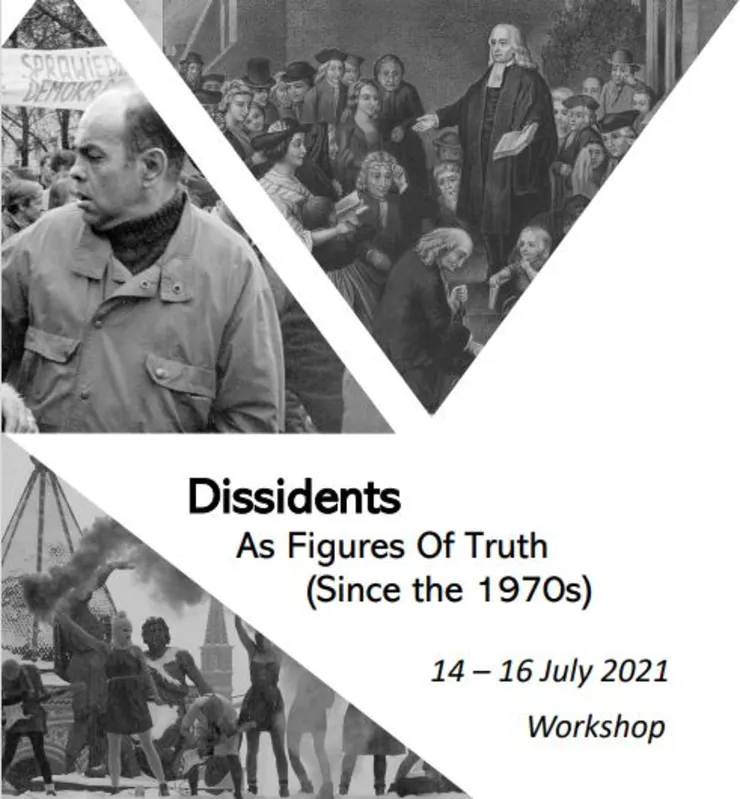
14.07.2021-16.07.2021 | Online | PECEE Research Centre
Today, we almost intuitively associate dissidents with Soviet intellectual nonconformists, and those from other countries of the Eastern Bloc, with towering figures like Václav Havel, Jacek Kuroń or Andriej Sacharow. At our conference, we want to look more closely at how the figure of the "dissident" became constructed and solidified across the Iron Curtain and after the fall of the Soviet Union. We will focus on practices, techniques, and media settings which (co)produce the dissident as a (mostly male) "truth figure" (Kleeberg 2019), which includes practices of staging oneself, and ways of embodying the (epistemic) values and virtues associated with this figure. As truth figures are historically heterogeneous, so is "the dissident," varying from person to person, group to group, from country to country, and changing over time which itself is a matter of our inquiry. Yet, as a truth figure, it became an important point of reference, used as self-designation by a variety of people from different poles of the political spectrum, not only across Soviet and Post-Soviet space. Central Europe, for instance, in the 1990s witnessed a mushrooming of dissidents, who had not been identifiable as such before. Obviously, a specific relation to truth is crucial for the figure of the dissident not only as it is understood today: from ancient parrhesiastes to today's dissidents, speaking the truth to power, being "true to oneself," "living the truth," has been essential.
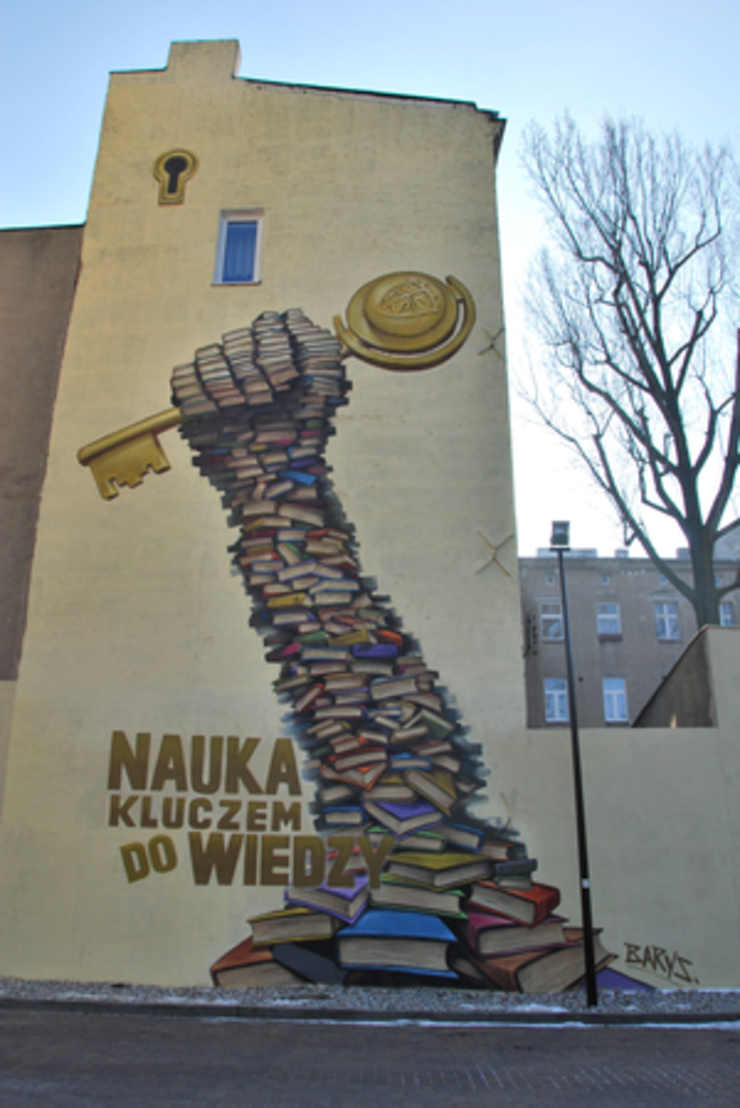
11.12.2020-12.12.2020 | Online | Research Centre PECEE
The online seminar is a fifth event organized by the Erfurt/Leipzig/Moscow working group on Political Epistemologies of (Eastern) Europe and focusses on academic authority and the scholar as the central figure of knowledge production. Observing a basic diversity and continuous transformation of epistemologies along with the emergence as well as destabilisation or decline of epistemic authorities, the seminar discusses the history of epistemological shifts in Central and Eastern Europe over the past fifty years. While directing its gaze at a recently contested expert of knowledge production - the scholar, it aims to investigate historical challenges of (academic) scholarship's role as the paramount producer of scientific truth.